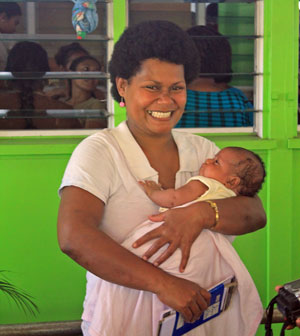Pneumonia is the single largest cause of child deaths worldwide. The World Health Organization estimates that every year, around 1.2 million children under five years of age die from pneumonia.
World Pneumonia Day, held annually on November 12, seeks to raise awareness about this insidious disease often caused by viruses, bacteria or fungi.
Australia is tackling childhood pneumonia in the Asia-Pacific by investing in the GAVI Alliance. The GAVI Alliance is a public/private partnership of international organisations, donor governments, developing countries, financing institutions and vaccine manufacturers committed to protecting people's health through increasing access to immunisation in the world's poorest countries.
In 2011-12, Australia invested $55 million in the GAVI Alliance, making us the sixth largest government donor.
Pneumonia can be prevented with adequate nutrition and hygiene and can be treated with antibiotics but vaccines play a key role in protecting children. Hib vaccine and pneumococcal vaccine protect against the two major bacterial causes of child pneumonia deaths. In Asia and the Pacific, the GAVI Alliance has recently introduced the Hib vaccine in Myanmar and Timor-Leste, and Pakistan has introduced pneumococcal vaccine into its routine immunisation program.
By the end of 2012, the GAVI Alliance will have assisted an estimated 13 million children globally to receive the life-saving pneumococcal vaccine. To date, 21 countries have introduced the vaccine, with the GAVI Alliance and its partners on track to immunise 90 million children with pneumococcal vaccines by 2015.
What is pneumonia?
Pneumonia is a form of acute respiratory infection that affects the lungs. The lungs are made up of small sacs called alveoli, which fill with air when a healthy person breathes. When an individual has pneumonia, the alveoli are filled with pus and fluid, which makes breathing painful and limits oxygen intake.

